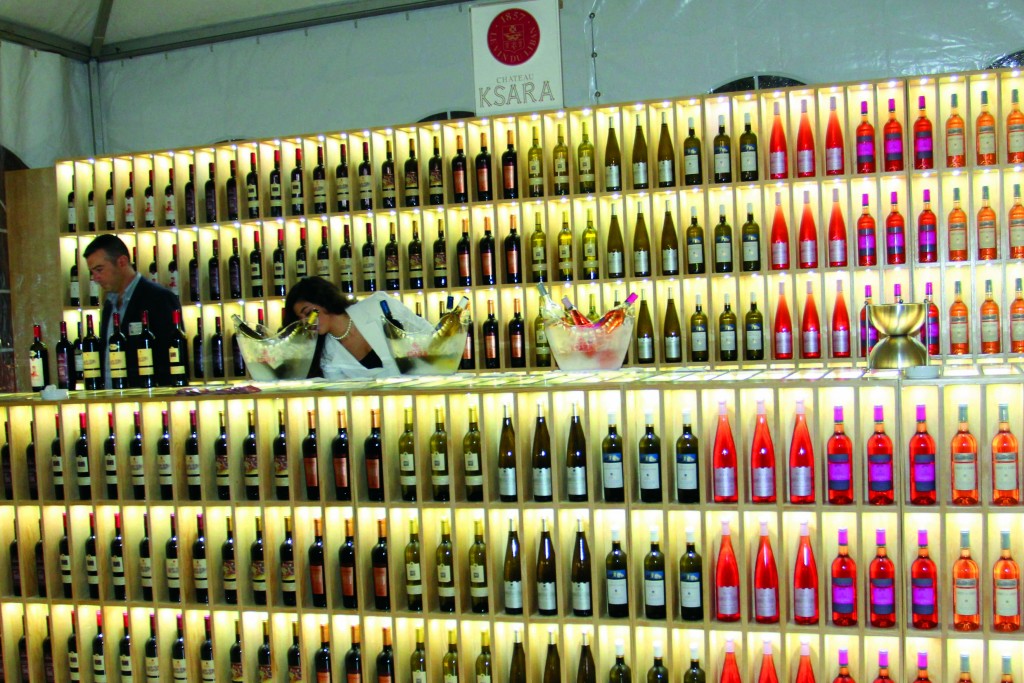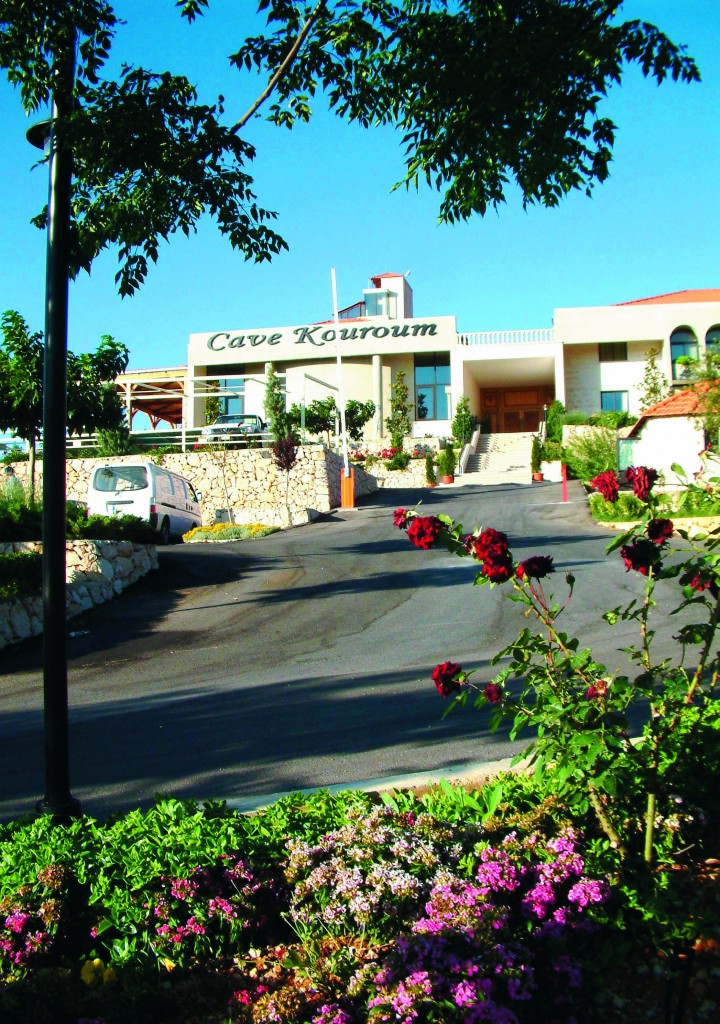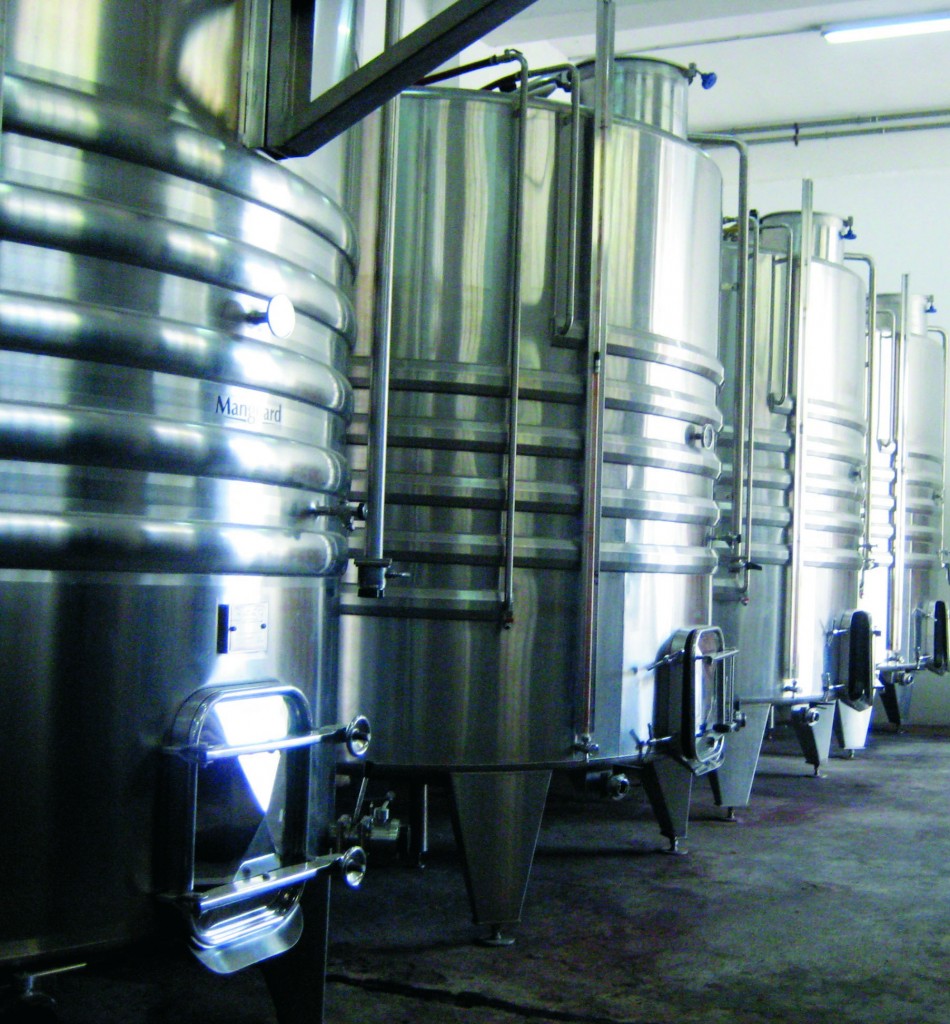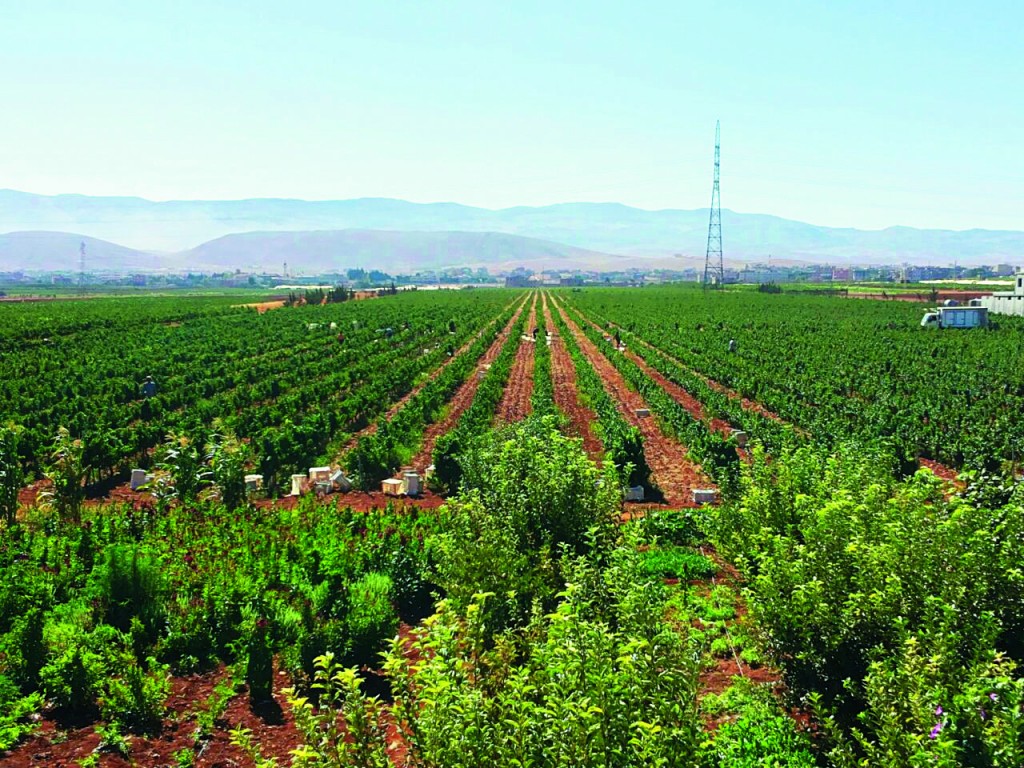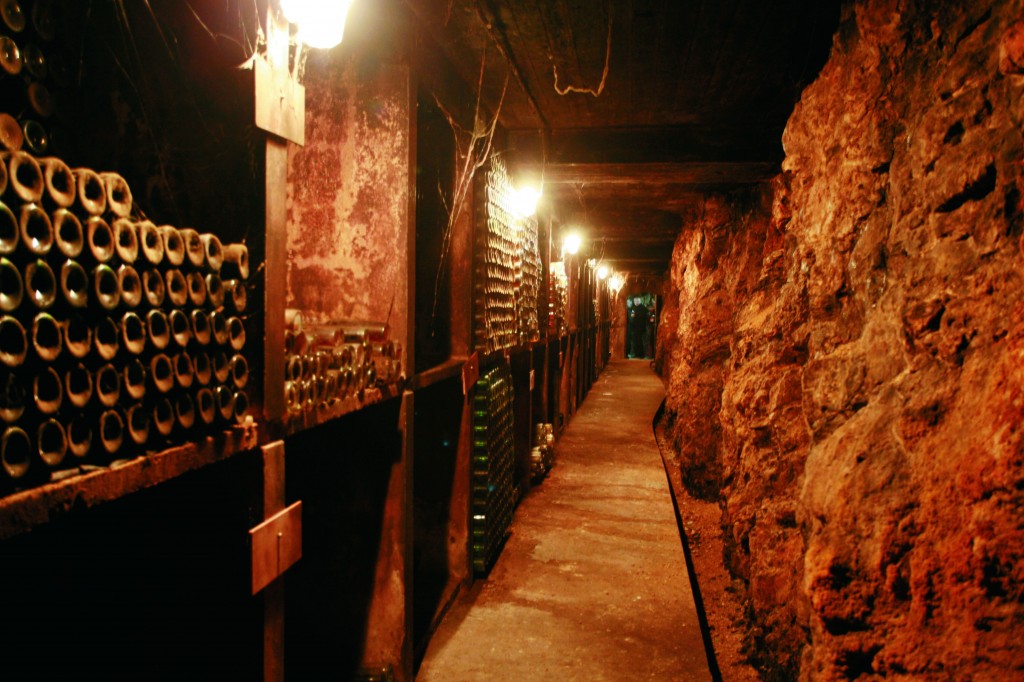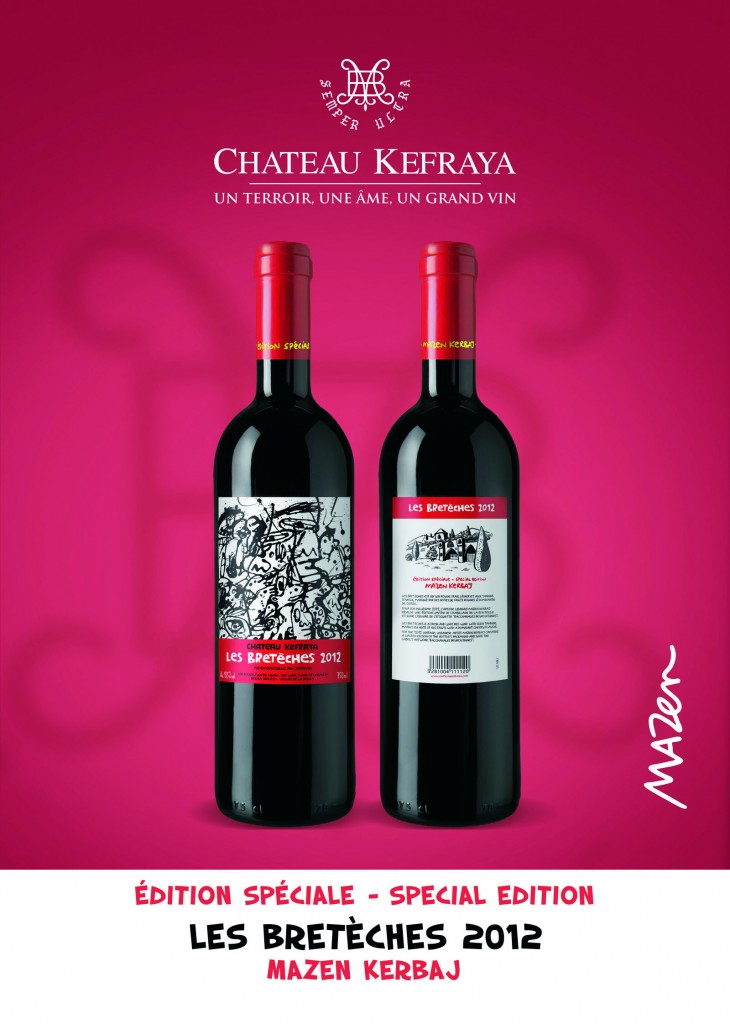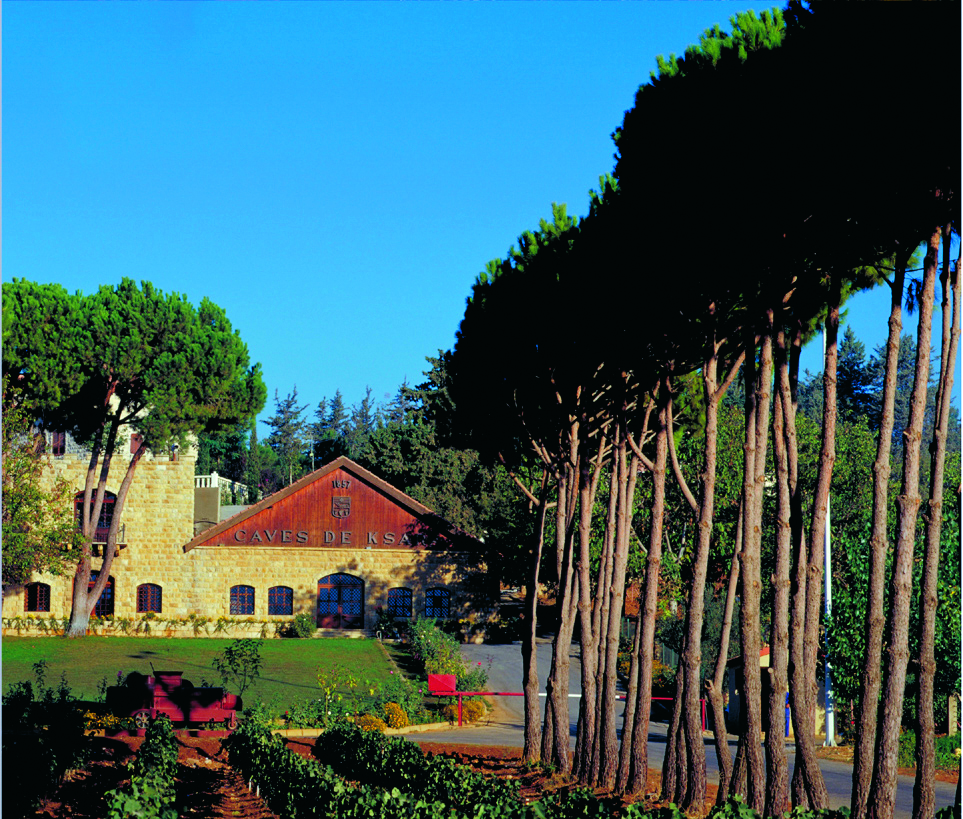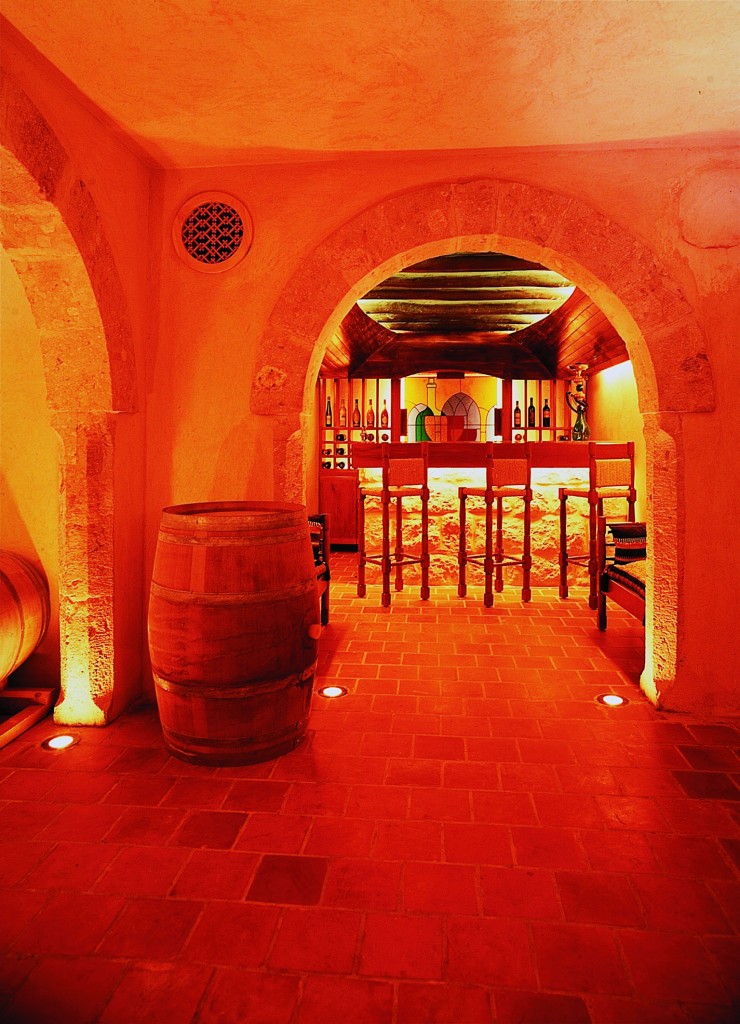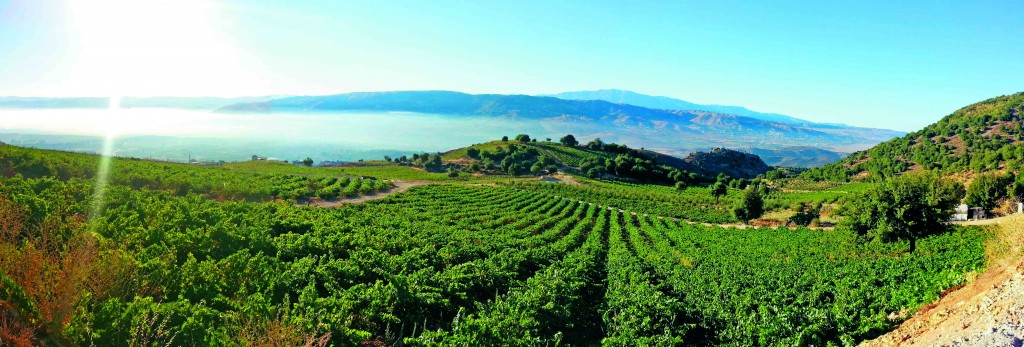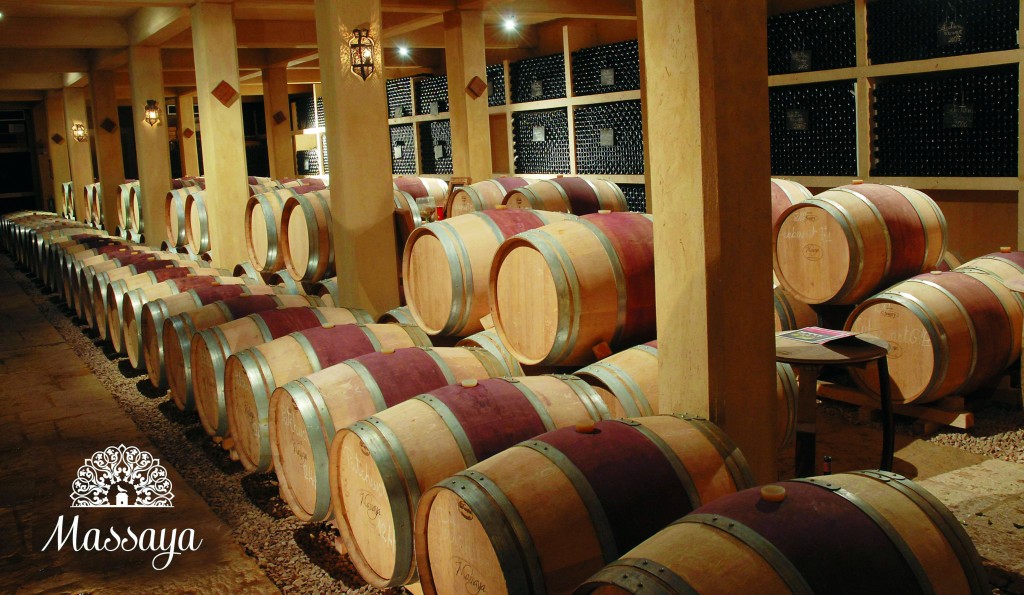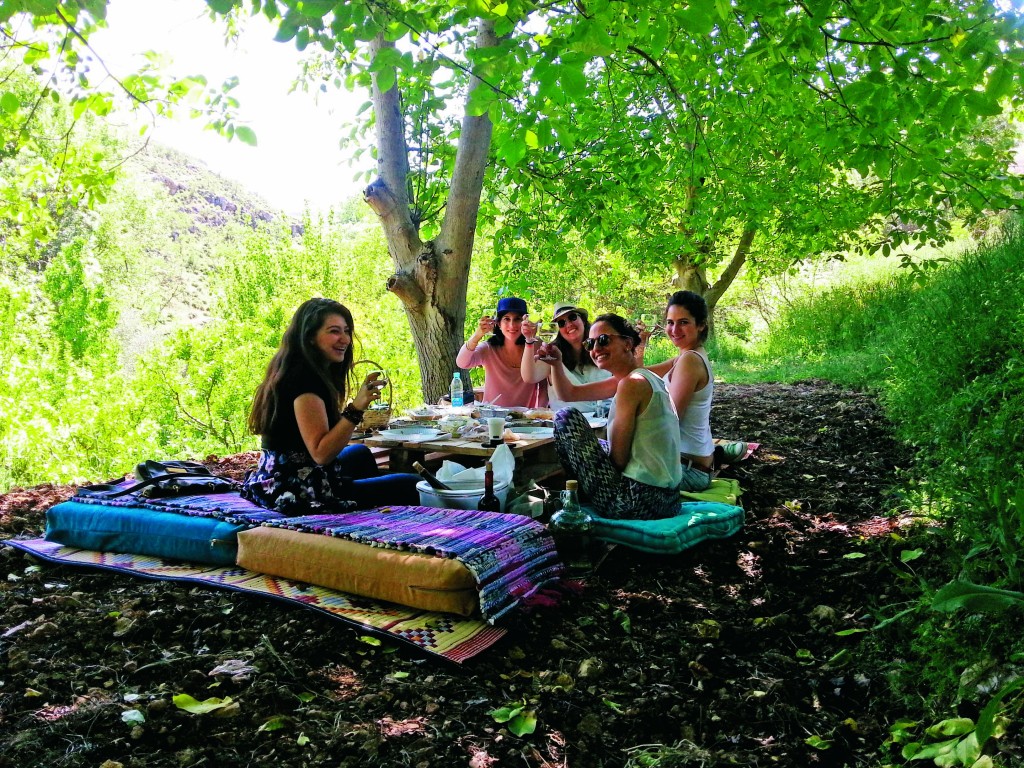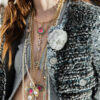The Phoenicians exported already, for over 4000 years their jars of wine and developed vineyards and wine cellars. Later, in Roman times in the middle of the second century BC, a temple was dedicated to Bacchus, the god of wine, in the region of Baalbeck. It was in the Bekaa Valley that viticulture has developed first. The monks used to produce wine for religious purposes. Today, the culture of vineyards conquered several areas including Mount Lebanon, Batroun and southern Lebanon where the vines also make excellent wines.
Cave Kouroum
Interview done with Bassim Rahal.
General manager and owner.
«The color is mostly determined by the type of grape and by the age of the wine. Red wines become lighter with age while white and rosé wine get darker with age.»
What characterizes your wine? We at Cave Kouroum are earnestly dedicated to achieving excellence and sustaining commitment in the application of quality to make superb wine and to provide a special place for passionate wine drinkers to build their wine knowledge and appreciation. Our philosophy is simple: ripe grapes, gentle handling and attention to detail, timely intervention, and thoughtful blending. A blend of traditional methods and new techniques are used to achieve such harmony within the wines, bringing out their natural qualities to the fore. All are expertly combined to offer an exceptional wine to various consumer preferences from the unique Lebanese soil. Cave Kouroum wines are built from the grape vine working all the way up the finished bottle. Choosing the right grape variety in conjunction with the proper care and follow up to obtain grapes that will provide the best in terms of juice and taste, in addition to the employment of all the modern technology through out the fermentation process, moreover and most importantly is the blend, is the secret to any great wine.
How could you recognize a good wine? There are five criteria to recognize a good wine: the color, the legs, the nose, the taste, and the after taste. The color is mostly determined by the type of grape and by the age of the wine. With blended wines the color is not typical of any specific variety. Red wines become lighter with age while white and rosé wine get darker with age. The «legs» of a wine are determined by the swirling motion, which helps determine the liquid qualities. «Legs» refers to the streaks of wine that trickle down in the glass after the liquid has settled. Longer or more noticeable legs indicate a fuller tasting wine, while thin legs indicate a thinner taste. The smell of a wine is called the «nose.» A good wine should smell appealing and intriguing. Certain smells are particular to certain grapes, but, in general, a wine should smell rich and delicious. Tasting the wine in a small sip and allowing it to sit in the mouth for a moment paying attention to the sweetness, aftertaste and presences of unique and fruity flavors. Simply put, a good wine will have a good taste. The after taste is the taste left in the mouth after swallowing the wine. This can be crucial to determining the type of wine that suits any personal tastes.
Château Fakra
Interview done with Abir Riachi Zeinoun.
Export manager.
Fakra has the best equipment and techniques for its wine ageing in french and american oak barrels which create Premium lebanese wines.
What characterizes your wine? The variety of Château Fakra’s Red, White and Rosé wines owe their particularity to the combination of the soils of fertile Bekaa valley and Mount-Lebanon. Apart from the exceptional characteristics of soil and climate, the harmonious blend of exceptional vine-plants; Cabernet-Sauvignon, Syrah, Cinsault and Grenache for red and rosé, we have to mention Muscat and Viognier for white; where every vine-plant exhales its personality in contributing to the final outcome of an inimitable wine in its absolute uniqueness.
How do you define your wine? The professional viti-œno follow-up of splendid vineyards, the latest vinification equipment and techniques and the ageing in French and American oak barrels all add up to give birth to a collection of Premium Lebanese wines.
What is the most appreciable wine that you have? Château Fakra’s most appreciable wine is Pinacle de Fakra that earned Gold medals year after year, at world’s most prestigious wine challenges. These rewards match the sustained pursuit of excellence adopted by Château Fakra.
Which wine can be representative as the image of your brand? Château Fakra, Collection Privée and Pinacle de Fakra both draw a bright image of the brand’s Premium wines. Collection Privée is a limited edition wine aged for 12 months in new oak barrels and Pinacle with its delicate fruity aromas and hints of spice is a very good choice.
How could you recognize a good wine? Our wines that have received golden awards again and again in international wine contests are surely excellent wines.
Château Ka
Interview done with Ghida Kassatly
Boulos, Marketing manager
and Jean Tannoury, wine maker.
Its first vintage is founded in 2005. Château Ka white wine is made from Sauvignon Blanc, Viognier, Muscat and Chardonnay blends.
What characterizes your wine? Château Ka wines are characterized by their body and their oak integration in all the Red wine range. The location of the vineyard in Baalbeck, a region with low humidity and low precipitation in winter, gives high quality balanced grapes with matured tannins, thus a wine suitable for ageing. White wine is crisp, fresh, fruity and tasty. It is made from an unexpected blend of Sauvignon Blanc, Viognier, Muscat and Chardonnay.
How could you recognize a good wine? First the robe of the wine is analyzed. It should be clear. A Red slightly brownish color indicates an aged wine. A red color means that the wine is not old. White wine should have crystal clear look, yellow with golden tinges. The nose should be exempt of off flavors like acetic odors. The pallet should have enough body. The fruit flavors should come when the wine is distributed over the taste buds. The more the flavors persist, the wine will be better. All of these should be balanced meaning that all the flavors should be noticed and none of them should jump strongly to hide another one.
Dr Carlos Guillermo el Adem
«Château Fakra emphasizes
on quality rather than productivity»
Awarded over sixty prizes for the excellence of its wines, Château Fakra draws its reputation in the fertile soil, the expertise, ultra modern facilities, among other factors that blend harmoniously to give this estimable wine its typical characteristics. Dr Carlos el Adem, president of Château Fakra, unveils to Prestige the secrets of the fame of this wine proudly bearing the label «Made in Lebanon».
What are the elements that contribute to the development of Fakra? The soil, climate, expertise, ethics, new ultra modern facilities including fermentation tanks, used today by leading wine producers and sophisticated winemaking equipment. Also noble grape varieties, a meticulous follow-up by oenologists, vinification under the direction of expert oenologists and subsequent aging in oak barrels from France and America.All of which blend harmoniously to give Château Fakra its particularity and make it a praised wine.
How can the fame of a wine depends on grape varieties? Château Fakra continues to expand its domain with a selection of noble grape varieties including Cabernet Sauvignon, Syrah, Viognier, Muscat…
What do you mean by Collection Privée and Pinacle of Fakra? Collection privée is a vintage of Cabernet Sauvignon and Syrah exclusively, aged in new French and American oak barrels for twelve months. Each vintage never exceeds ten thousand bottles, which are all numbered. It is an opulent wine to serve with meat and cheese. Pinnacle is the highest point of a Castle which implies a superior wine. It is a red wine made from Cabernet Sauvignon, Syrah and Cinsault. This ideal blend has notes of ripe red fruits, spices and vanilla. This is an excellent wine highly appreciated with grilled meats and cheese.
Do you export Fakra wine, and where? Château Fakra exports more than 60% of its wines in various countries: Sweden, France, Mexico, Canada, USA, Russia, Jordan, Egypt, Bahrain, UAE, Turkey, Malta, Germany and Spain.
The ideal cellar, in your opinion? A good cellar is irreplaceable. Wine is a living product. The ideal cellar should exclude these four elements: heat, light, vibrations and odors. Sudden changes in temperature damage wine. The ideal storage is around 13ºC, the temperature of a natural cellar. We do not think enough how to protect the wine from light. It still runs other risks such as odor, which easily crosses the corks.
What is your assessment of the Lebanese wine in general, and Fakra in particular? The survival of this vital sector of the Lebanese national economy depends on the expansion of export markets and on sale internationally. Lebanon is a small country. Its strength is in maintaining its typical characteristics and superior quality, hence the need for strict regulation of production and control that are beginning to be managed by the National Institute of Vine and Wine (INVV) of which I am the vice-president. The participation of Fakra and another wineries in international exhibitions and wine tastings, contribute to spread our Lebanese products and improve their reputation. Fakra in particular has earned a special place and is successfully developing export markets.
What is the recipe for success and continuity of Fakra? Limited production according to the highest international standards, typical soils, expert winemakers, constant openness to innovations and Château Fakra which will soon inaugurate a boutique hotel with wine bar, spa vino-therapy, school of wine, tasting room and a new ultra-modern winery, all of which will create an extraordinary façade for our products. The reputation of Fakra wines on the lebanese and international markets makes of Château Fakra a remarkable winemaker.
In which local and international trade shows do you participate? Château Fakra participates annually in local and international exhibitions including Vinifest, Horeca, some regional fairs in Lebanon. Internationally: London Wine & Spirit Fair, Vinexpo, Vinisud, IWC International Wine Challenge…
You have received many awards… We won golden, silver and bronze medals, as well as quality seals in international competitions held in Brussels, Estoril, Montreal, Paris, Vienna, Verona, London.
Fakra wine in three words… Château Fakra «The Wine of the Gods.»
Château Musar
Interview done with
Gaston Hochar. Director.
The image of this brand has been recognized all over the world, especially the red wine. Most of its production is exported to the United-Kingdom.
What characterizes your wine? Château Musar wines are characterized by their elegance and finesse, their complexity and long ageing potential. These wines, in red or white, are produced naturally, with the least intervention possible and without using any additives. They are multidimensional on the palate, making you discover hundreds of different tastes with their complexity and the length of their aftertaste. They reflect the terroir and climate of Lebanon as each vintage is a perfect representation of that year and has its own specific character.
How do you define your wine? Our wines are like our children: we care about them during their birth, ie the fermentation, we educate them when stored at the winery, we prepare them for their onward journey through the bottling process and we finally let them live their lives when they are released and sold to the market.
What is the most estimable wine that you have? The most appreciated wine is difficult to specify as popularity can be measured in different ways. The Château Musar red is the most popular if you consider the spreading and appreciation of this wine around the world. The Château Musar white is perfect for those who are in search of something different and special as it is produced from a blend of two local Lebanese indigenous grape varieties. The Hochar Père et Fils is a wine that pleases all palates and is quite successful. The Musar Jeune is the new range of young wines for the young generation, which is becoming more popular in the world.
Which wine can be determinate as the image of your brand? The image of our brand is our iconic wine which is the Château Musar red as it has been recognized around the world for its characteristics, its specificity and is sought after by the wine connaisseurs.
How could you recognize a good wine? A good wine is a wine which makes you feel happy and at ease. It is alive and in constant evolution, and is a true reflection of the origin of the product, without being killed by the technology to produce it.
Château Kefraya
Interview done with Fabrice Guiberteau. Œnologist
Château Kefraya only uses its own grapes from vineyards planted exclusively on village lands in Kefraya. «A good wine always leaves consumers and critics talk about it.»
What characterizes your wine? Our wine is characterized by its origins, related only to the region of Kefraya. Château Kefraya only uses its own grapes from vineyards planted exclusively on village lands in Kefraya and without irrigation. Aware that the quality of a good wine begins in the vineyard, being granted a varied palette of grape varieties and soils, allowing us to ‘compose’ our wines through combinations. Our primary objective is to offer rich, elegant and delicate wine corresponding to the certification of Château Kefraya soils. Through this, we also wish to highlight the degree of precision that is implemented both in the vineyard and the cellar to keep the style ‘Kefraya’ over time.
How could you recognize a good wine? Recognizing a good wine is like admiring a beautiful canvas. It provides pleasure during tasting. A good wine always leaves consumers and critics talk about it. It is humble, it suggests much more than it reveals. It is eclectic. When we taste a good wine, it feels perfectly the values of men and women who worked to create it in a balanced way. Which gives it a timeless value. His quality is measured by the test of time in its regularity vintage after vintage.
Zafer Chaoui
«The healthy and constructive competition improves the quality of wine.»
Red, rosé or white. Wine, this beverage of the gods, 4,000 years old, dates back to the Phoenicians, who introduced the famous nectar in the region. Good wine, it is said, delights the heart of man. Especially when it is question of Ksara, one of the oldest Lebanese wines. With over 150 years of history, this wine is undergoing a major expansion. Zafer Chaoui, Chairman of Ksara, tells Prestige the story of a reputation acquired over the centuries.
What makes the difference between Ksara and other Lebanese wines? Notoriety, natural caves, modern equipment, professionalism.
Which Ksara wines are mostly appreciated by the Lebanese? And foreigners? White and rosé wines of Château Ksara are popular both in Lebanon and abroad. La Réserve du Couvent, a red wine is our most famous and certainly the best-selling wine. For connoisseurs, Le Souverain and La cuvée du IIIe millénaire are exceedingly appreciated. This applies both for the local market and for export.
Do you export Ksara wine? Which one? And where? We export about 40% of our production and this represents around 1.2 million bottles. Réserve du Couvent, Blanc de Blancs, Cuvée du Pape and Sunset are our best sellers in exported wines. We export towards 34 countries.
Can you classify your different categories of wine? Of course, we have the range of entry level wines, superior wines, varietal and Châteaux.
The ideal cellar, in your opinion? The ideal cellar is the one with stable temperature of 13 °C, with humidity of 60% and where darkness, absence of vibrations and lingering odors are ensured. This is the case in the natural caves of Ksara extending over 2 kms.
How do you evaluate Lebanese wine in general, and Ksara in particular? The ratio quality to price in Lebanese wine is exceptional. Healthy and constructive competition improves quality. Our wines cumulate the medals, our wines are exported all over the world and this is evidence of an overly positive evaluation.
What is the recipe for success and continuity of Ksara? Perseverance, from 1857 to 1972 during the Jesuits era, pioneers in the production of contemporary wines in Lebanon and, since 1972, their successors who have been working continuously to improve this jewel of Lebanese wines.
In which local and international trade shows do you participate? Locally we participate in Horeca and Vinifest, Vinifest being particularly targeted on wine. Internationally, Prowein (Germany), Vinexpo (France), The London Wine Fair (England), are the exhibitions we attend regularly. To these are added occasional participations in exhibitions taking place in different countries.
Ksara wine in three words… Tradition, nobility, modernity.
Château Ksara
Interview done with Rania Chammas. PR Manager.
«Wine tasting involves all the senses. Only a few moments are required at the time of your first sip from the bottle to form your opinion.»
What characterizes your wine? Château Ksara has been able during the last two decades to strengthen its corporate philosophy and to build on a historical tradition. This has bolstered brand equity and market positioning. Château Ksara focused on its history and on its strong assets and it has stressed its tradition through the Ksara name and lineage and its nobility through its quality. It has emphasized its modernity by investing in state-of-the-art equipment, hiring the best staff and embarking upon innovative and aggressive local and international marketing campaigns. Furthermore, Château Ksara introduced new exciting varietals, pioneered vines on wire, launched the single varietal of grape wines (Chardonnay and Cabernet Sauvignon), niche wines (Gris de Gris and Cuvée de Printemps) and restructured the whole philosophy of wine making in Lebanon by blending all those new varietals together. These gave to Ksara wines their typicity and specificity.
How could you recognize a good wine? Wine is hard to understand but easy to love. No matter where you fall on the «expensive wine is better» spectrum, we all have something in common: At every price point, we want a good bottle of wine. What does «good» mean, though? It’s a completely subjective evaluation… unless you ask a professional. People talk about quality like a matter of preference and flavor, but while we’ve found that there are a number of personal preferences that influence what people like and think are best, there are also a number of objective factors that anyone can recognize: complexity, intensity, balance and typicity. Wine tasting involves all the senses: sight, smell and taste, as well as texture. Each sense gives you clues as to the wine’s overall taste profile. With a little practice, you can learn to detect and enjoy the myriad of subtleties that good wines possess. Only a few moments are required at the time of your first sip from the bottle to form your opinion. You will quickly find that as you improve and become more knowledgeable at guessing the grape variety, the more you will appreciate those delicate distinctions and the more fun you will have while savoring your wine.
Domaine Wardy
Interview done with Aziz Wardy. General Manager.
Founded in 1891 in the deepest lebanese traditions, the large wine production of Domaine Wardy has reached many countries in the world.
What characterizes your wine? Domaine Wardy offers a full range of wines, renowned for their depth, complexity and elegance. All of our products reflect our passion and expertise. Mixture of ancient and modern winemaking techniques, Domaine Wardy intends to reflect the soil and history of one of the oldest wine regions in the world. Our wines are fine and gourmets. With a well-defined identity, they remind us by their character, the warmth and sunshine of our country. To pay tribute to our heritage, we chose to produce a wine with the emblematic grape of Lebanon Obeideh. And for the first time, this endemic variety, unique in Lebanon, is magnified in the bottle.
Domaine des Tourelles
Interview done with Christiane Issa Nahas. Marketing Manager.
It was founded by François-Eugène Brun in 1868 in Chtaura in the Bekaa Valley. Today Domaine des Tourelles is a family business.
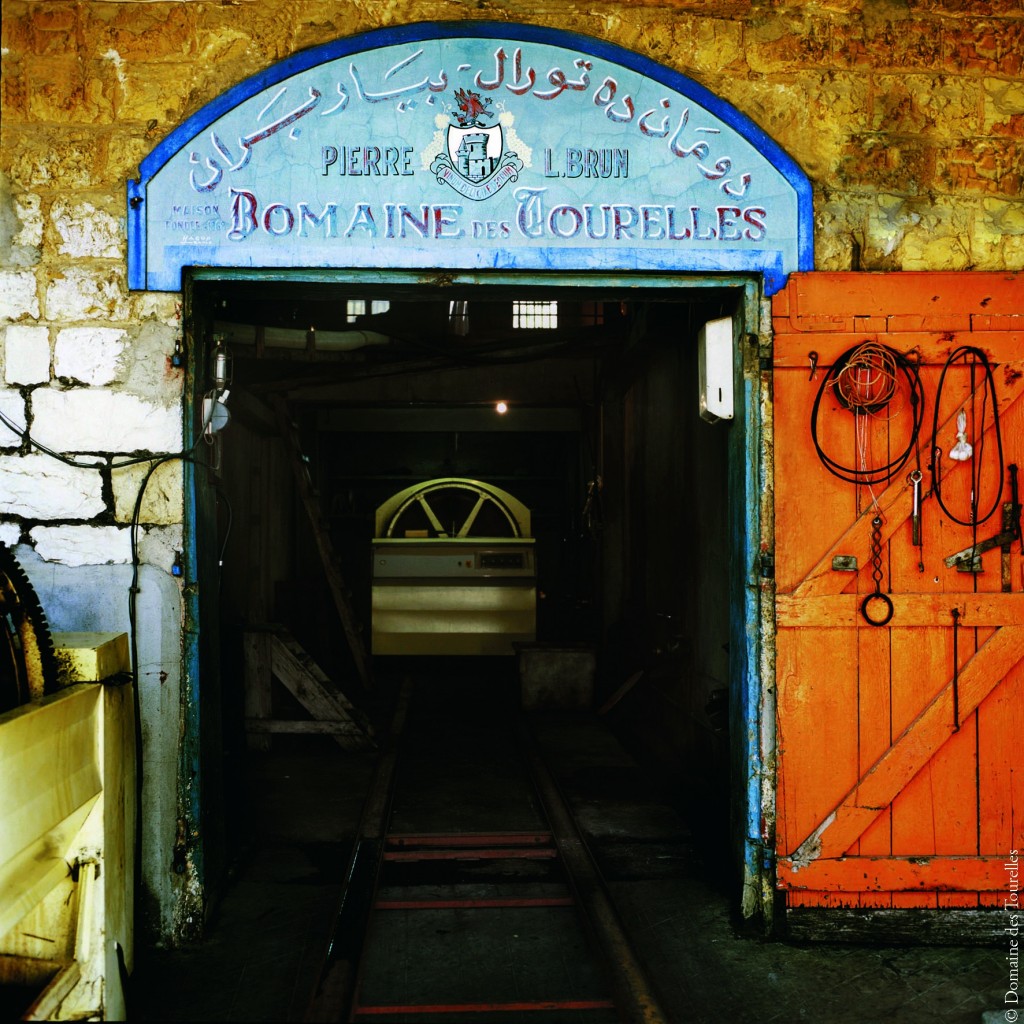
What characterize your wine? A taste of complexity and freshness that comes from an extraordinary terroir, the Bekaa valley! High altitude, clay and lime stone soil, mild winters and long cool summers; all this is ideal to have one of the best terroir in the world!
Domaine des Tourelles Red is a perfect entry level wine with a well integrated tannins and a complex nose. Grapes: Cabernet Sauvignon, Syrah and Cinsault.
Marquis des Beys has beautifully integrated oak tannins with layer of concentrated fruit. Grapes: Cabernet-Sauvignon and Syrah Oak aging: 18 months in French oak. Syrah du Liban; the flagship of Tourelles! 100% Syrah 24 months aging in American oak.
Domaine des Tourelles white: a lovely light gold hue, lots of acidity and freshness and a long dry finish. Grapes: Chardonnay, Viognier and Muscat d’Alexandrie. And last is «Le fameux Rosé des Tourelles»: a powerful dark salmon color with a strong taste of exotic fruits. Grapes: Cabernet -Sauvignon, Syrah and Tempranillo.
How could you recognize a good wine? Only a cork opener, a glass and your taste buds can do that! First is the smell: before taking a sip we stick the nose in the glass and take a whiff; it should smell fruity or floral but if the odor is bad like a wet newspaper or a smelly dog meaning the bottle is corked. Second is the balance: it’s an important aspect of a good wine. A perfect balance between acidity, tannin, alcohol and fruit… Third is its length or finish: when the wine is swallowed we should see how long the flavor lasts on our palate; the longer it lingers, the better the wine.
Château Qanafar
Interview done with Eddy Naim. General Manager.
Château Qanafar is a relatively new winery in the West Bekaa producing wines using Cabernet Sauvignon, Syrah, Merlot, Sauvignon Blanc and Viognier.
What characterizes your wine? Our wines are made only with grapes from our own vineyards, yielding high quality wines. They are full-bodied, with ripe black and red fruit combined with silky oak tannins yielding intense flavors and aromas with an incredibly long finish.
How would you recognize a good wine? I would say each individual should have his or her own idea of what is a good wine. Enjoying wine is a very personal and subjective experience, and just as some people prefer a char-grilled steak while others prefer a crispy salad, some people prefer light, fruity, acidic wines while others prefer rich, full-bodied, powerful wines. Everyone is entitled to their own opinion. Don’t let anyone tell you what you should and shouldn’t like!
Massaya
Interview done with Sami Ghosn. Owner.
Massaya’s partnership with french wine makers provided a special place and successfully developing of the brand. More than 85% of the production is exported worldwide.
What characterizes your wine? Massaya is a boutique size winery and wine. It usually implies quality and close attention to detail through all the process from sustainable and eco friendly viticulture, manual grapes sorting, none filtering and maturing the wines in optimized altitude conditions (in Massaya Faqra cellars). Furthermore Massaya vineyards are selected in uniquely remote areas ideal from grape growing and where the vines «suffer» for producing quality grapes, wines (90% of the quality in a wine stems from the grapes quality)… Be it Ras Baalbeck, Hadath Baalbeck, Tanaïl and recently Faqra where Massaya white grapes are planted and Massaya Blanc is produced. In addition to the fact that co owner Ramzi Ghosn is the hands on wine maker (which is quite unique in Lebanon as wineries usually hire œnologists-wine makers for making their wines). Furthermore Massaya enjoys unique expertise thanks to its French partners Le Vieux Télégraphe in Châteauneuf-Du-Pape, the Brunier family and Dominique Hebrad previous owner of Château Cheval Blanc from Saint-Emilion, Bordeaux.
How could you recognize a good wine? This question is endlessly vast and vague and the answer differs to everyone’s taste and standards. My brother Ramzi and myself created Massaya based on our personal view of what is a good wine.
Château Nakad
Interview done with Jalal Nakad. Winemaker.
«Côteaux de la Békaa» is Château Nakad’s pride, its vineyards grow on the slopes of the Bekaa Valley. Their grapes produce distinct aroma wine.
What characterize your wine? In producing our wine we work meticulously to select the finest grapes and the varietals (cépage). Quality is always our chief consideration. «Côteaux de la Békaa,» written on our label, and meaning vineyards grown on the slopes of the Bekaa, highlights the uniqueness of our chosen terroir. Our hill-grown grapes produce wines with distinct aromas and flavors. Unlike vines grown on the Bekaa’s plains, the drainage of the hills limits the dilution of our grapes’ flavor. This rare grape selection helps enable us to produce extraordinary wines that add real diversity to a fast-growing wine industry in Lebanon.
How could you recognize a good wine? A good wine should be aromatic, it should provide a balance between its alcohol, its acidity and its tanins.


